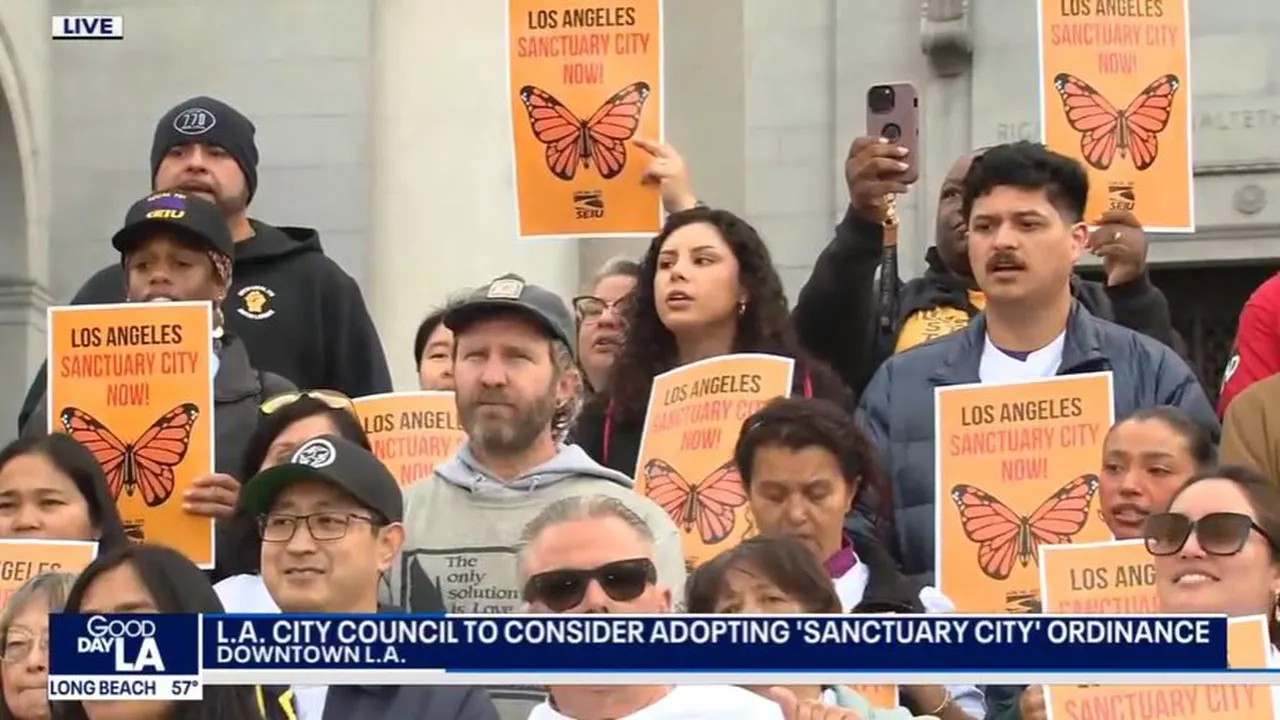Los Angeles votes on sanctuary city ordinance

Los Angeles city lawmakers voted Tuesday to formally adopt a sanctuary city ordinance, weeks after President-elect Trump’s victory, amid promises to carry out mass deportation raids. The 13-0 vote will prohibit Los Angeles from providing any city resources or personnel to be used to help federal enforcement of immigration laws.
City Attorney Hydee Feldstein Soto, along with Mayor Karen Bass, released the draft ordinance last week that was written with help from immigration groups. Council members Hugo Soto-Martinez and Monica Rodriguez, who chair the council’s Civil Rights and Public Safety committees, respectively, waived the matter from their jurisdictions to expedite a vote on the matter.
California has been a sanctuary state since 2017 with the passage of SB 54, which prohibits local law enforcement agencies from using resources to investigate, detain, report, or arrest people for immigration violations.
During a debate Tuesday, many public speakers pushed for the sanctuary ordinance, saying immigrant communities should be protected from “unimaginable cruelty” of raids that could separate families and target migrants who come to the U.S. to work. However, others raised concerns about the depletion of resources given to help illegal immigrants, given that the city is contending with mass homelessness and a housing crisis.
Sanctuary cities typically don’t cooperate with federal immigration authorities, refusing to honor detainer requests from U.S. Immigration and Customs Enforcement (ICE) which are used to take custody of criminal illegal immigrants for deportation. Many times, such jurisdictions will release the suspects back onto the street without informing ICE, leading to potential reoffending.
The vote comes two weeks after President-elect Trump defeated Vice President Kamala Harris, following a campaign in which he promised to tighten the southern border and carry out mass deportations of millions of illegal immigrants, targeting criminals who’ve committed a variety of crimes after illegally entering the United States.
Former Los Angeles Mayor Eric Garcetti issued an executive directive in 2019 that offered protections to immigrants. Los Angeles has followed sanctuary city guidelines but an ordinance was never codified into law. Additionally, the Los Angeles Police Department mandates that its officers not inquire about immigration status or make arrests related to a migrant’s legal status.
Newly appointed Los Angeles Police Department Chief Jim McDonnell has said the department won’t participate in immigration enforcement. The Los Angeles County Republican Party criticized the ordinance, saying sanctuary protection would shield criminals who have entered the United States illegally.
Trump’s victory has spurred officials in various parts of the country to vow to push back on deportations. On Sunday, Boston’s Democrat Mayor Michelle Wu said her city won’t cooperate with any deportation operation from the incoming Trump administration, despite her region seeing a number of illegal immigrants being charged with crimes and released back onto the streets.
Arizona’s Democratic Gov. Katie Hobbs said her state, which voted for Trump, will not be aiding the incoming administration with its “misguided” plan to launch a mass deportation operation. Following California Gov. Gavin Newsom vowed to fight the incoming Trump administration.
In conclusion, the adoption of the sanctuary city ordinance in Los Angeles highlights the ongoing debate surrounding immigration policies in the United States. The city’s decision to prioritize the protection of immigrant communities and limit cooperation with federal immigration authorities reflects a broader trend among sanctuary cities across the country. The impact of this ordinance on public safety and resources remains a point of contention, but it underscores the complex challenges faced by local governments in navigating immigration enforcement in the current political climate.




